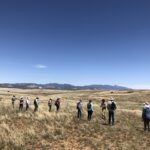On July 12, HR 4402, the “National Strategic and Critical Minerals Production Act of 2012” passed the House with a vote of 256 – 160. Twenty-two Democrats voted with Republicans. This bill declares all domestic mineral extraction vital to the nation’s security, infrastructure and economic security. HR4402 would require less public review and environmental protection for all hardrock mines proposed anywhere in this country! Instead of improving the 1872 Mining Law, this bill sets out to force a broken system to work faster.
The House rejected five Democratic Amendments to the bill. One, introduced by Raul Grijalva, was to prohibit mineral permits for any activity that would affect hunting, fishing, grazing or recreation on public lands.
Here are some articles from around the web about the passage of this bill.
Republicans push through mining deregulation bill that could avoid US environmental reviews
House bill would cut environmental review time for mines
Anderson issues mining challenge
Duffy draws from Wisconsin mining bill lessons
Legislation will streamline approvals process: Clement
And this excerpt from the Hill blog is at the heart of the matter:
“House passage sends the bill to a Democratic Senate that is likely to ignore the bill. On Tuesday, the Obama administration said it “strongly opposes” the bill because of its implications for the environment, and agreed with House Democrats that it would streamline permitting procedures for nearly all hardrock mining.”
However, that is no reason for us to rest on our laurels. It’s an election year, and this bill, as it moves to the Senate, is like a ticking time bomb. It is precisely the environmental review process that affords us, as citizens, the opportunity to protect our public lands, our air, our water, and our economic viability as a tourist based economy. This bill shows that the process, as it stands, is indeed preventing some mining companies from moving forward with their path of destruction, and that’s precisely why this bill was concieved in the first place.
We’ll let you know when this bill moves on to the Senate for a vote, and we’ll have a letter available for you to sign and send. If you’re not already subscribed to our e-newsletter, you can do so Here.










